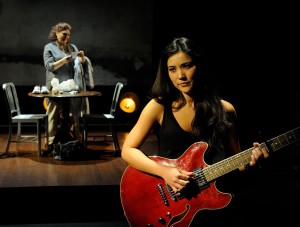
Trinity Rep resident company member Anne Scurria as Helen and Brown/Trinity Rep MFA actor Leah Anderson as Clementine (foreground) in Love Alone by Deborah Salem Smith. Directed by Tyler Dobrowsky and Deborah Salem Smith, this world premiere drama is now playing at Trinity Repertory Company as part of the Three by Three in Rep. Sets by Michael McGarty, Costumes by William Lane, Lighting by Dan Scully. Photo by Mark Turek.
Love Alone by Deborah Salem Smith, Trinity Repertory Company, 2/28/12-5/27/12, http://www.trinityrep.com/on_stage/current_season/st.php,
Reviewed by Kate Lonberg-Lew
(Providence, RI)
When someone you love dies unexpectedly, you struggle with grief. And so does the cast of Love Alone at the Trinity Repertory Company. Unfortunately, they also struggle to portray the nuance and rawness of the emotions that course through a person and a family at times such as these.
The play opens when Helen (Anne Scurria) learns her wife has suffered a fatal complication resulting from a routine surgery. Helen and her daughter, Clementine (Leah Anderson), are left to pick up the pieces and soldier on. But before they can, they must understand what went wrong. What they discover is negligence. Helen wants to sue, but has no legal rights, as their marriage is not recognized by the state, and a reluctant Clementine must pick up the torch. They are not the only ones dealing with loss and guilt, however. Becca (Angela Brazil), the anesthesiologist, and her husband, PJ (Mauro Hantman), must deal with these feelings as well, and the effects they have on her reputation and marriage. The play follows these journeys through the resulting minefield.
The playwright takes on heady subject matters that will certainly spark thoughtful conversations surrounding regret, expectation, obligation, loss, and love. The script, and the production are peppered with thoughtful, genuine moments. Many of these surround the lawyer, Mr. Rush (Richard Donelly). His consultation with the distraught Clementine, and his deposition of Becca bring about some the most genuine moments in the play.
But when loss hits with this kind of unexpected force it leaves so much more than grief in its wake. There is guilt and shock. There is disbelief. There are the repeated punches to the gut when you realize you’ve set an unneeded plate at the table, or called someone who can no longer answer. And while there is no lack of effort or big emotion in the production, ultimately actors Anderson and Scurria just don’t have enough trust in the script or each other to allow the nuances and rawness of these emotions to come through. There are not alone in this; it permeates the production and applies to Brazil and Hantman’s performances, as well.
The two families share space on stage, necessitating unnatural blocking and placement of props. Also, the direction fosters louder emotions, such as anger, to the detriment of subtler ones. The directors, Tyler Dobrowsky and Deborah Salem Smith, keep the story unfolding quickly, at times neglecting to leave space for actors’ emotional beats. And the script, while strong, shies away from the stickier issues raised in the premise, such as a wife who’s denied her rights as next of kin. In short, there is a wealth left unexplored.

Revision 3/18/12 23:41